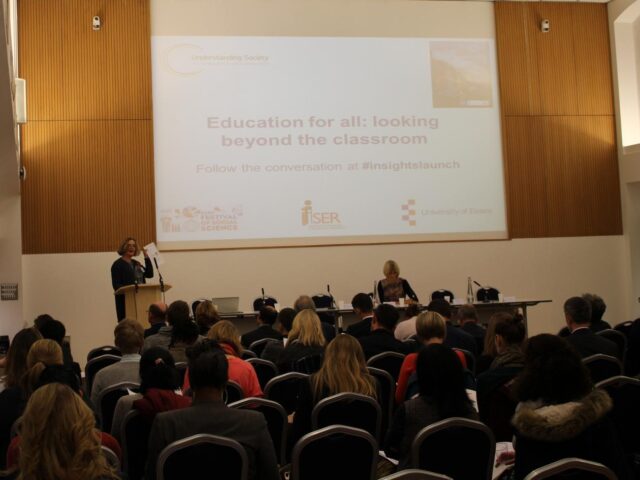Understanding Society is a unique resource for science and policy. By following the lives of all individuals within households over time, data from Understanding Society are a vital resource for understanding the causes and consequences of fundamental deep-rooted social problems – such as poverty dynamics, family breakdown, moving in and out of employment, poor educational achievement, behavioural change and poor health – and developing policies to tackle them.
Insights 2016 illustrates some of the ways in which the Study is being used to understand four key areas: education; heath and employment; families; and devolution. The evidence presented also demonstrates the value of the unique features of the Study for policy research.
A key benefit of longitudinal data is that we can better understand the timing of events and ‘what comes first’, which helps to shed light on when and how to intervene. This is well demonstrated by evidence in the health and employment chapter. Webber and colleagues show the significant toll that experiencing mental health problems can have on employment, while Jones and colleagues examine specific health shocks, such as cancer, and investigate the effects on employment. Sage uses the data to explore the mechanisms that link employment and health by looking at the changes in people’s circumstances when they become unemployed but are subject to different labour market policies. The large sample size allows researchers to analyse particular subgroups of the population and the richness of the data means that a range of mechanisms can be investigated, providing evidence on how to support employment at different stages of illness and recovery.
By enabling researchers to link survey data with geographic information Understanding Society is used to examine people’s situations in places that do and do not have specific policies. This is illustrated by three papers here: Burgess and colleagues’ investigate the impact of the selective education systems on adult wages; Faber and colleagues’ examine education outcomes as a result of differences in broadband speeds either side of telephone exchanges boundaries; and the devolution case study explores the impact of the introduction of plastic bag charges in Wales compared with other UK countries. Identifying people who live in places with and without a particular policy, the data from Understanding Society is then used to ensure other differences between people living in these places are taken into account to investigate the specific impact of these policies.
Understanding Society data can also be linked to administrative data on individuals who take part in the study, where they consent to this. The evidence by Martin and Faber and colleagues illustrates this by using data from school test records, held by the Department for Education, to examine the impact of immigration processes and broadband speeds respectively on children’s progress at schools.
Panel studies repeatedly measure the same things over time so that changes in people’s lives can be investigated in the context of wider social and economic contexts. For example, Schoon and colleagues create different cohorts to investigate how economic changes affected education and employment opportunities at the transition from adolescence to adulthood during 2000s. Brewer and colleagues use data from Understanding Society and the British Household Panel Survey to examine changing family structures over the last few decades. Both pieces of research rely on the regularity of data collection meaning that such transitions are more accurately captured than when there is less frequent data collection.
With over 5,000 data users, and a range of innovative experiments alongside the main study, a wide range of evidence and scientific learning is produced from Understanding Society on an ongoing basis. Insights 2016 distinctly demonstrates some of the ways in which Understanding Society data is being used to produce valuable policy learning.
Read Insights 2016
- Read online
- Download PDF of Insights 2016
- For a paper copy of the publication, please email your name and address to Jay James and state: ‘Insights Postal Request’ in the subject line.
- Follow the #insightslaunch conversation on Twitter
Related links
- Read previous Insights reports
- Subscribe to the Understanding Society newsletter
- Register for Understanding Society events and training




